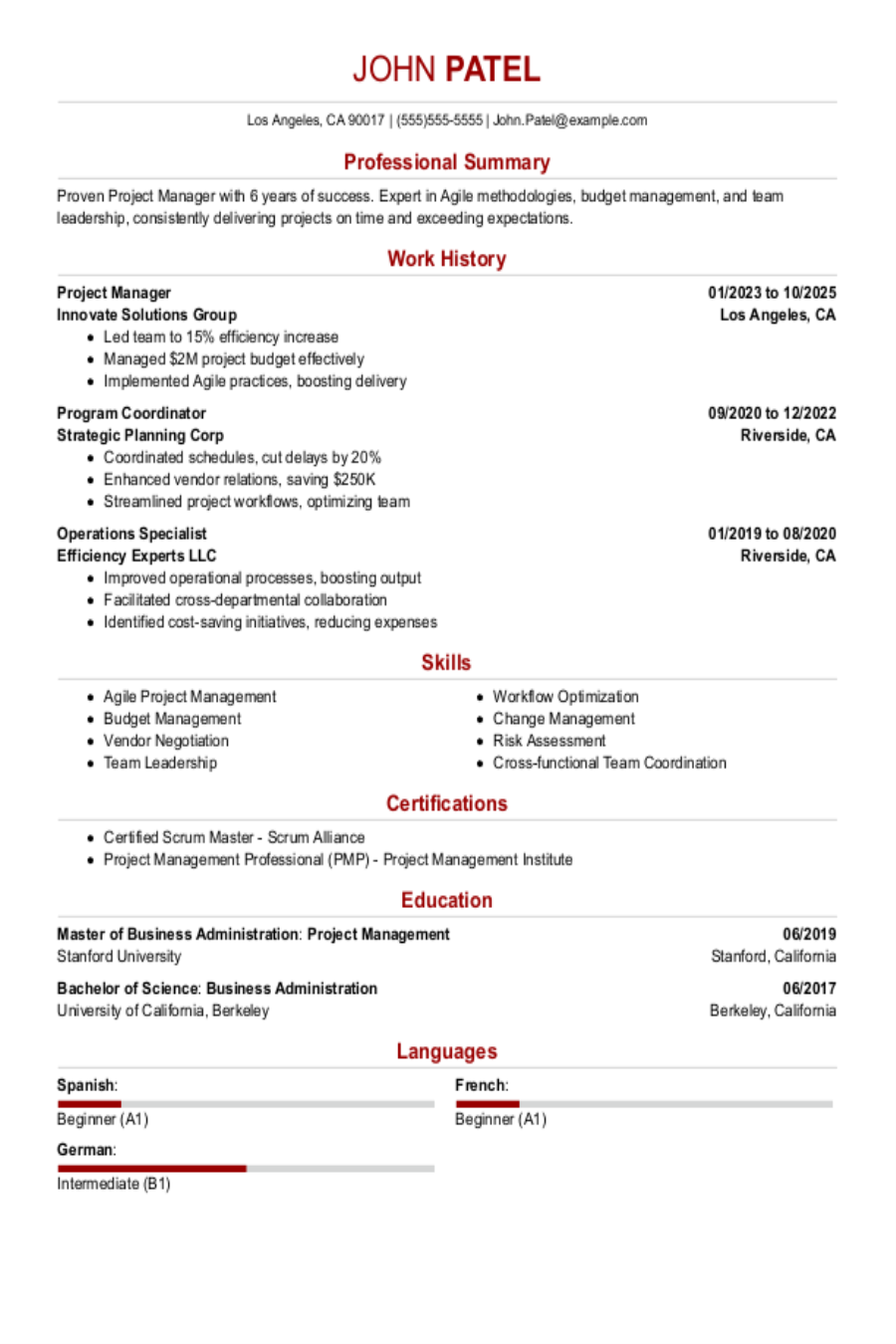Popular Business Intelligence Analyst Resume Examples
Entry-level business intelligence analyst resume
An entry-level resume for a business intelligence analyst should highlight analytical skills, relevant coursework, certifications such as SQL or Tableau, and any project experience to show capability.
Showcases education: This resume builds the candidate’s credibility by placing a strong focus on their educational background, establishing their expertise despite limited experience.
Places skills over experience: The functional resume format strategically highlights this candidate's analytical skills and successful project outcomes, such as improving reporting efficiency by 30%, rather than their limited work history.
Mid-career business intelligence analyst resume
A mid-career business intelligence analyst resume should emphasize a combination of analytical skills, relevant experience, and continuous professional growth to effectively attract potential employers' attention.
Balances skills and experience: This applicant's resume effectively showcases their technical prowess in data analysis and dashboard development while illustrating a clear trajectory of growth from research analyst to business intelligence analyst, highlighting powerful achievements.
Includes mix of skills: This resume effectively highlights a mix of technical skills and interpersonal strengths, showcasing the job seeker's analytical capabilities alongside their ability to collaborate and communicate insights.
Experienced business intelligence analyst resume
An experienced business intelligence analyst resume should prioritize showcasing quantitative achievements and relevant skills that illustrate the job seeker's impact on data-driven decision-making and organizational growth.
Optimized for ATS: This resume features a clean, professional template that combines a well-structured header with an ATS-friendly resume format, making it easy for both human readers and automated systems to navigate the content.
Quantifies achievements: Quantifiable achievements allow recruiters to quickly grasp the impact of a job seeker's work. By presenting metrics, such as a 30% reduction in reporting time or a 20% boost in data accuracy, accomplishments become tangible and compelling.
No experience business intelligence analyst resume
A resume for an applicant with no experience should highlight relevant skills, education, and any projects or internships that showcase analytical abilities and familiarity with data tools.
Overcomes lacking experience: Including volunteer work and extracurricular activities in a resume improves it by demonstrating relevant skills and commitment, which can be particularly valuable for applicants with limited professional experience.
Emphasizes professional skills: Highlighting analytical skills and relevant coursework demonstrates the job seeker's readiness for a business intelligence analyst role, despite limited direct experience in the field.
More resume examples
Business Intelligence Analyst Resume Template
Looking to improve your career in data analysis? This business intelligence analyst resume template serves as a solid foundation—simply personalize it with your unique details and achievements.
Min Zhang
Oakridge, OR 97467
(555)555-5555
Min.Zhang@example.com
Professional Summary
Dynamic BI Analyst with 6 years in advancing business data strategies. Proven in designing efficient dashboards and minimizing costs. Expert in using data to enhance business operations.
Work History
Business Intelligence Analyst
Insight Innovations Corp - Oakridge, OR
November 2023 - October 2025
- Increased data efficiency by 25% via new BI tools
- Developed three dashboards optimizing decision-making
- Reduced reporting time by 40% through process automation
Data Analyst
TechAdvance Analytics - Portland, OR
November 2021 - October 2023
- Enhanced data reliability by 30% with accurate models
- Collaborated to cut data processing costs by 20%
- Executed data solutions increasing revenue by $50k
Junior Business Analyst
DataQuest Solutions - Portland, OR
November 2019 - October 2021
- Interpreted trends leading to 15% growth in sales
- Assisted in data strategy improving outcomes by 10%
- Designed analytical reports aiding in plan execution
Skills
- Data Visualization
- SQL Programming
- Advanced Excel
- Python for Data Analysis
- Predictive Analytics
- Dashboard Development
- Data Mining Techniques
- Business Intelligence Tools
Education
Master of Science Business Analytics
University of California, Berkeley Berkeley, California
June 2019
Bachelor of Science Statistics
University of Washington Seattle, Washington
June 2017
Certifications
- Tableau Desktop Specialist - Tableau Software
- Certified Business Intelligence Professional (CBIP) - TDWI
Languages
- Spanish - Beginner (A1)
- French - Beginner (A1)
- German - Beginner (A1)
Writing Your Business Intelligence Analyst Resume
Having explored these effective resume examples, you are now prepared to dive into the intricacies of how to write a resume. We will walk you through each section in detail, ensuring you create a compelling document that stands out.
List your most relevant skills
An effective skills section for your business intelligence analyst resume should focus on both technical competencies like data analysis and software skill, as well as soft skills such as critical thinking and communication. This balanced approach demonstrates your readiness to tackle the multifaceted nature of the role.
To improve your resume's impact, incorporate keywords from the job listing into your skills section. These keywords help align your application with what recruiters are seeking and ensure that applicant tracking systems recognize you as a qualified applicant.
Example of skills on a business intelligence analyst resume
- Proficient in data visualization tools (Tableau, Power BI) for effective reporting
- Experienced in SQL and database management for data extraction and analysis
- Effective communicator with strong collaboration skills to drive business goals
- Analytical thinker with keen attention to detail and accuracy
Highlighting your soft skills on your resume can set you apart from other job seekers. Employers often seek interpersonal abilities, as they are challenging to develop and essential for fostering a positive work environment.
Highlight your work history
A strong work experience section should emphasize your achievements and clearly illustrate how you've applied your analytical skills to drive results. Focus on showing the impact of your work, using data-driven examples that highlight your ability to transform insights into actionable strategies.
Each job entry must include key details such as your title, the employer's name, and the dates of employment. These elements provide a framework for employers to verify your professional background. Additionally, make sure to quantify successes when possible—such as improvements in efficiency or cost savings—to underline the value you brought to previous roles.
Example of a business intelligence analyst work experience entry
- Business Intelligence Analyst
Tech Innovations Inc. - San Francisco, CA
June 2019 - Present - Develop and maintain complex data models and dashboards using Tableau, providing actionable insights to drive strategic decisions across departments
- Conduct in-depth analysis of market trends and customer behaviors, presenting findings that led to a 15% increase in customer retention rates
- Collaborate with cross-functional teams to define key performance indicators (KPIs) and optimize reporting processes, improving data reliability by 30%
- Automate data collection processes using SQL and Python, reducing manual reporting time by 50% while improving accuracy
- Mentor junior analysts on best practices in data visualization techniques and analytical methodologies, fostering a culture of continuous improvement within the team
Highlighting outcomes and achievements in your experience section allows you to demonstrate the real impact of your work. Employers are more engaged by specific results rather than a mere list of duties, as it reflects your ability to drive change and add value. This strategy not only showcases your skills but also differentiates you from other job seekers in the competitive job market.
Include your education
The education section of your business intelligence analyst resume should list your academic credentials in reverse-chronological order, starting with the most recent degree. Exclude your high school diploma or associate degree if you have completed a bachelor's degree or higher.
For ongoing or incomplete education, note your highest level achieved and include the expected graduation date. Include bullet points with relevant coursework or outstanding academic projects if you are currently studying or recently graduated.
Common certifications for a business intelligence analyst resume
- Certified Business Intelligence Professional (CBIP) – Data Warehousing Institute (TDWI)
- Microsoft Certified: Data Analyst Associate – Microsoft
- Tableau Desktop Specialist – Tableau
- IBM Certified Designer - IBM Cognos Analytics – IBM
Sum up your resume with an introduction
A compelling profile section in your resume is important for making a strong first impression. This section serves as your elevator pitch, summarizing your qualifications and setting the tone for the rest of your application.
If you're an experienced applicant, opt for a professional summary that emphasizes your key achievements and relevant skills. This approach allows you to showcase what you've accomplished over your career right at the top, providing quick insight into why you're a strong fit for the role. If you have limited experience, consider writing a goals-focused resume objective that emphasizes your dedication to career growth.
Professional summary example
Analytical business intelligence analyst with over 5 years of experience in transforming data into actionable insights. Demonstrated success in optimizing reporting processes, improving decision-making capabilities, and driving strategic initiatives. Proficient in data visualization, predictive analytics, and cross-functional collaboration to support organizational growth.
Resume objective example
Enthusiastic business intelligence analyst eager to use analytical thinking and problem-solving skills to drive data-driven decisions in a forward-thinking organization. Committed to employing skill in data visualization and statistical analysis to improve operational efficiency and support strategic initiatives.
As a business intelligence analyst applicant, your resume profile should be concise and packed with key information. Aim for three sentences that highlight your most relevant skills and experiences while keeping the focus sharp and compelling. Save any additional details for your cover letter.
Add unique sections to set you apart
Including optional resume sections can help you stand out as a business intelligence analyst by highlighting your unique qualifications. These sections allow you to showcase skills and experiences that may not fit into the traditional resume format.
By incorporating relevant hobbies and volunteer work, you give potential employers insight into your personality and values. This not only demonstrates your commitment to continuous learning but also reveals how your interests align with the role. Showcasing projects or community involvement related to data analysis or problem-solving can further illustrate your capabilities in a professional context.
Three sections perfect for a business intelligence analyst resume
- Languages: As a business intelligence analyst, data interpretation is key. Fluency in multiple languages can help you collaborate with diverse teams and present insights more effectively. Highlight your language skills on your resume to stand out.
- Volunteer Work: Including volunteer work on a resume can improve your professional skills and demonstrate your dedication to community service. It showcases qualities like teamwork and leadership, which are valuable in any career path you pursue.
- Accomplishments: As a business intelligence analyst, quantifiable accomplishments are vital to illustrate your impact on decision-making. Emphasize these achievements within your work history or by creating a dedicated accomplishments section.
5 Resume Formatting Tips
- Choose a format that matches your career stage.
Choosing the right resume format is essential based on your career level. If you have extensive experience, a chronological format highlights your job history effectively. For those just starting, a functional resume focuses on skills rather than work history. Consider a combination format if you want to showcase both skills and experience.
- Pick a smart resume template.
To improve the readability of your resume, consider using a professional resume template. This not only organizes your information clearly but also makes it easier for hiring managers to quickly identify key details. If you opt for a custom format, prioritize simplicity and select fonts that are compatible with applicant tracking systems.
- Select an appropriate font.
Choose a clean and professional font to improve your resume's readability. Fonts like Helvetica, Garamond, or Verdana are excellent choices that appeal to both applicant tracking systems and hiring managers alike.
- Use consistent formatting.
Align your resume to the left and maintain uniform margins to ensure a polished and professional look that captures attention effectively.
- Keep your resume to one or two pages.
When building your resume, remember that resumes should be one page long. If you have extensive experience, you can use a second page. However, always keep your content concise and focused on what matters most to potential employers.
Tools for Your Job Search
Are you ready to pursue your dream role as a business intelligence analyst? Before submitting your application, consider using our ATS Resume Checker. This valuable tool offers insights on how well your resume aligns with the automated systems that many organizations use for initial job seeker screening.
If you're looking for an effective way to improve your resume, our AI Resume Builder provides tailored recommendations specific to your business intelligence skills. It also offers professionally designed templates that effectively showcase your analytical abilities and accomplishments.
Frequently Asked Questions
Last Updated: November 13, 2025
Absolutely. A cover letter is important because it adds depth to your resume and establishes a direct line of communication with potential employers. It allows you to express your enthusiasm for the role and demonstrates how your background makes you an excellent fit. So, take the time to write a cover letter that showcases your unique qualifications.
For a quick and efficient way to create your cover letter, consider using our AI Cover Letter Generator. It’s designed to help you produce a tailored, strong cover letter in just minutes. Plus, you can choose from various cover letter template options that perfectly match your resume for a polished presentation.
A resume is a concise document, typically ranging from one to two pages, that highlights your professional skills and experiences relevant to the job you are applying for. In contrast, a CV (curriculum vitae) can extend for several pages, providing an in-depth overview of your academic background, research contributions, publications, and extensive professional experience.
For positions in academia, science, law, or medicine, you’ll often need a CV. If a CV is what you require for your next opportunity, our online CV Maker can assist you in crafting a polished document quickly. You can choose from a variety of tailored CV templates designed for different industries and career levels to create your standout application effortlessly.
To build a standout business intelligence analyst resume, select a modern, professional template and integrate relevant keywords from the job description. This strategy will improve your visibility to potential employers.
To build a compelling skills section as a business intelligence analyst, combine your technical skills in data analysis and visualization tools with essential soft skills like communication and problem-solving. In your experience section, illustrate how you applied these skills to deliver actionable insights that drove strategic decisions and improved performance.
Most business intelligence analysts start as data analysts or junior positions, gaining essential skills. With experience and advanced training, they can progress to senior roles or take on managerial responsibilities within organizations.
To excel as a business intelligence analyst, focus on continuous learning through certifications and specialized training. Engage with industry organizations to network and share insights. Keep abreast of trends by following relevant publications and participating in online courses that improve your expertise and skill set.
Was this information helpful? Let us know!
Hailey is a career advice writer dedicated to helping job seekers excel in their careers.
More resources

What Is an ATS Resume? How to Write a Job-Winning ATS-Friendly Resume
The rise in applicant tracking systems (ATS) means resumes nee...

How to Write a One Page Resume: Guide & Examples
In today s fast-paced job market where recruiters often rev...

What Should a Resume Look Like in 2026? (+ Examples)
A good-looking resume will always use simple fonts and an easy...

Entry-Level Resume: Examples & Templates
As you embark on your career having a standout resume is impo...

Construction Project Manager Resume: Examples & Templates
As a construction project manager your resume must capture th...

Engineering Project Manager Resume: Examples & Templates
As an engineering project manager your resume must capture th...

